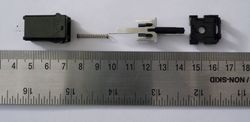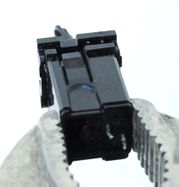Siemens ST
 | |
| Manufacturer | Siemens |
|---|---|
| Switch type | Tactile |
| Sense method | Gold crosspoint |
| Bounce time | 1-2 ms, up to 30 ms (typical) |
| Actuation force | 80 g |
| Total travel | 6 mm |
| Switch mount | Plate mount |

Siemens ST is a provisional name for a switch from Siemens that precedes the Siemens STB "Schreibtasten" switch family; hence, it was decided to call the series ST at Deskthority.[1] We don't know the Siemens name of it.
Characteristics
- 80 g actuation force
- keytravel 6 mm
- contact crosspoint type
- gold-plated
- 60 mΩ
- typical bounce 1–2 ms, up to 30 ms
- Key feel: the switch has a pronounced tactile event which Siemens called "dem deutlich spürbaren Druckpunkt" which loosely translates to "the clearly noticable pressure point".
History
The Siemens ST switch was manufactured by Siemens EC division for their own Transdata Terminal keyboards and teletypewriters in the 1970's and 1980's; the Siemens ST switch was not present in the catalogue of preferred parts (Schwerpunkttypen) that Siemens sold to others.
The Siemens ST switch was already used for the Transdata system a year before the Siemens T1000 was introduced. They are mostly associated with these teletypewriters, which were in widespread use and for which a lot of material can still be found on the web, whereas the elusive Transdata terminals had already disappeared in the 1980s.
Siemens patent DE2933983 (US4365903), filed in August 1979 and titled «Lockable key with luminescent display for office typewriters and teleprinters» is about a modification of the switch, so it is not actual proof of the original switch. An excerpt of it:
Luminous-indication key for key boards in office and teleprinting machines. A lockable key for use on electronic keyboards in office typewriters and teleprinters has a receptacle at an upper portion thereof for receiving a light emitting diode which is mounted in a small circuit board which can be snapped into the upper portion of the key and which is supplied current via flexible interlaced wires. A lower portion of the key has a guide element which cooperates with a guide pin carried on a side of the key base for retaining the upper portion of the key in a depressed state after a first actuation thereof, and for allowing return of the upperportion of the key to the original position after a successive actuation thereof.
Gallery
Space bar stabilisers in the same keyboard
References
- ↑ Deskthority — Siemens switch looking for a provisional name give me your ideas Posted 2016-09-26. Retrieved 2024-05-15.
External links
- Deskthority — Siemens Transdata terminal keyboard & Siemens T1000 switch Posted 2014-11-03. Retrieved 2024-05-14.
- Piotr Ciesielski — Siemens TD 81610 — picture gallery (utensilia.tk) (Wayback Machine) Archived 2016-11-02.
- Fernschreibamt-Hausneindorf — Siemens T1000 (No. 1) — picture gallery of T1000 teletypewriter (Wayback Machine) Archived 2019-04-14.









